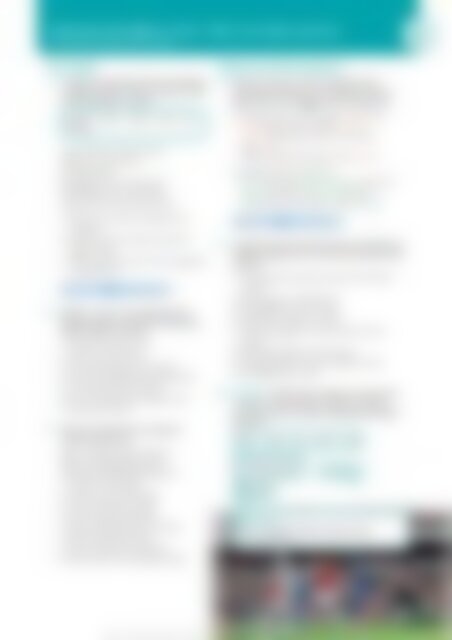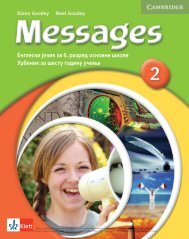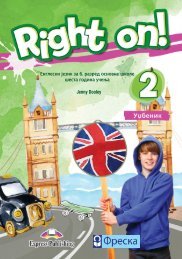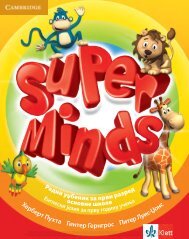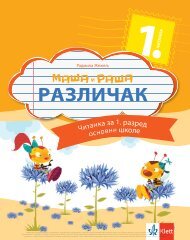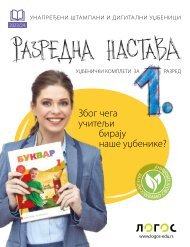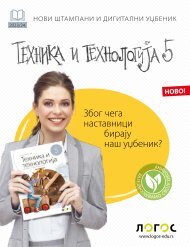Енглески језик 8, уџбеник, старо издање, Нови Логос
- No tags were found...
Create successful ePaper yourself
Turn your PDF publications into a flip-book with our unique Google optimized e-Paper software.
LANGUAGE FOCUS <br />
I can talk about things I did in the past.<br />
S<br />
Past simple<br />
1 Complete the sentences from the listening<br />
on page 6 with the words in the box. Then<br />
answer questions a, b and c.<br />
bought wasn’t didn’t were did<br />
started<br />
I 1 scared, but I was nervous.<br />
I 2 some new clothes.<br />
You 3 young!<br />
She 4 when she was only six.<br />
What 5 you do on Saturday?<br />
I 6 see you at the sports centre.<br />
a Which of the verbs are regular and<br />
irregular?<br />
b How do we form the past simple of<br />
regular verbs?<br />
c Which verb do we use to form negatives<br />
and questions?<br />
More practice Workbook page 7<br />
2 1.05 Listen to Tina talking about a<br />
football match and answer the questions.<br />
Write complete sentences.<br />
1 What did Jim give Tina?<br />
2 When was the match?<br />
3 How did they get to the match?<br />
4 Did a lot of people watch the match?<br />
5 Did Chelsea win the match?<br />
6 How many goals did Drogba score?<br />
7 Why was Jim sad?<br />
3 Write true affirmative and negative<br />
sentences about you.<br />
(go to a football match) last year<br />
I went to a football match last year.<br />
I didn’t go to a football match last year.<br />
1 (watch TV) last night<br />
2 (listen to music) yesterday<br />
3 (meet friends) on Sunday<br />
4 (do homework) yesterday<br />
5 (play video games) this morning<br />
6 (ride a bicycle) last week<br />
7 (buy a present) last weekend<br />
8 (be at home) on Saturday evening<br />
Object and subject questions<br />
4 Look at structures a and b. Find three more<br />
examples of structure b in the Memory quiz on<br />
page 6. When do we not use did in a question?<br />
a question word + did + subject + main verb<br />
Who did you visit? I visited my aunt.<br />
Which did you get, the bus or the train?<br />
I got the bus.<br />
(The question word refers to the object.)<br />
b question word + main verb<br />
Who visited you? My grandfather visited me.<br />
Which cost more? The train cost more.<br />
(The question word refers to the subject.)<br />
More practice Workbook page 7<br />
5 Complete the past simple questions with object or<br />
subject question forms. Then ask and answer with<br />
a partner.<br />
1 Who (sit) next to you on your first day at<br />
school?<br />
2 What (you / talk) about?<br />
3 Who (teach) you to read?<br />
4 What books (you / read)?<br />
5 What toys (you / have) when you were<br />
young?<br />
6 What (happen) to those toys?<br />
7 Who (cook) dinner last night at home?<br />
8 What (they / cook)?<br />
6 ACTIVATE Find out about things your partner did<br />
in the past. Use the ideas in exercise 3 and the<br />
question words in the box. Ask object and subject<br />
questions.<br />
when what who where why<br />
When did you last go<br />
to a football match?<br />
Who won?<br />
Last year.<br />
Finished?<br />
Write a paragraph about a great day out.<br />
Last month I went ...<br />
Starter unit 7<br />
Property of Oxford University Press. Provided for and<br />
restri<br />
tricte<br />
ted to cre<br />
eati<br />
ating<br />
acc<br />
cess<br />
essib<br />
ible format<br />
ts for users<br />
with a disabi<br />
abilit<br />
lity.


